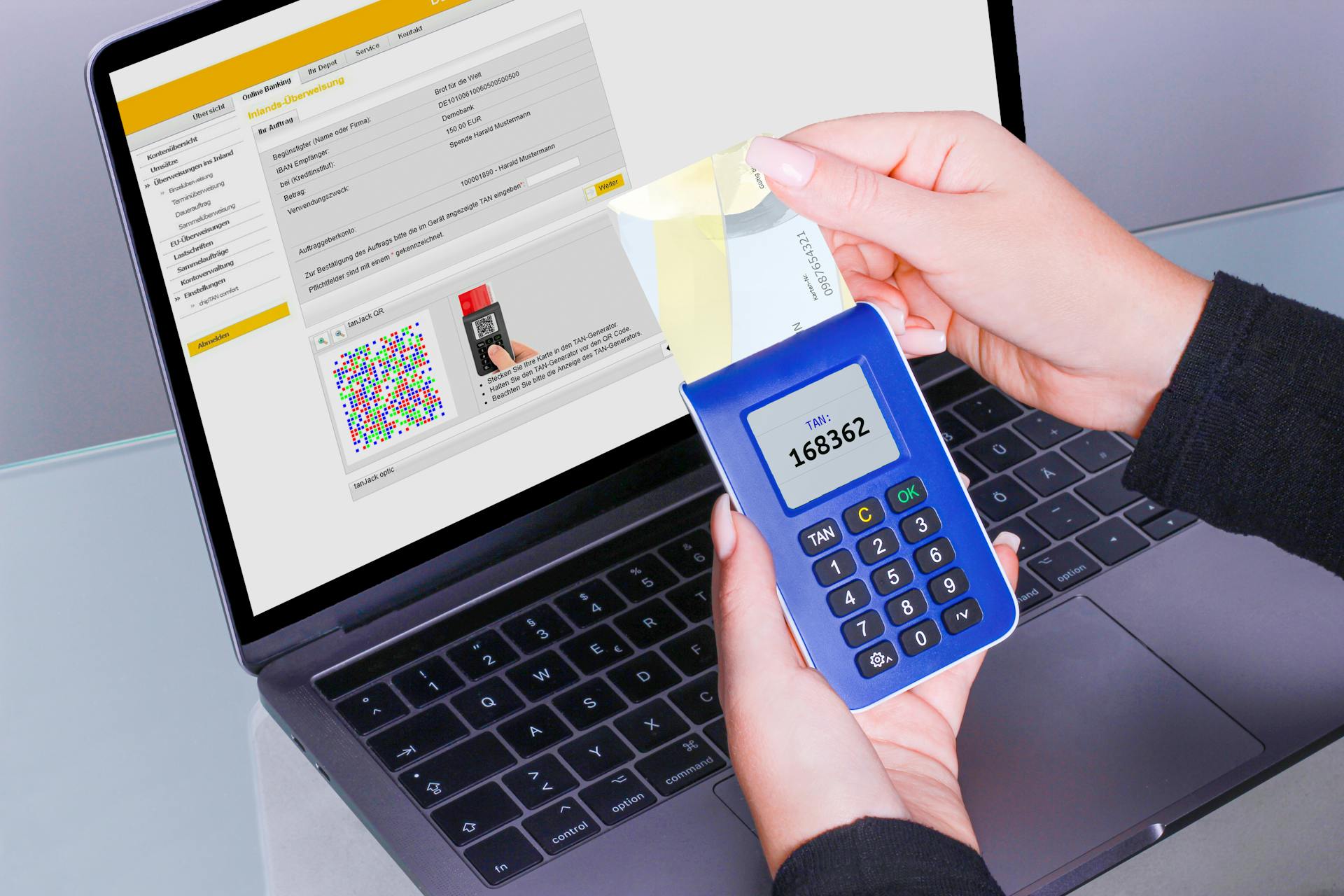
Online banking has become a norm, but it's essential to follow best practices to ensure a secure experience. Use strong, unique passwords that are at least 12 characters long, as recommended by the article. This will help protect your account from unauthorized access.
Two-factor authentication is also a must, as it adds an extra layer of security. It requires you to provide a second form of verification, such as a code sent to your phone or a biometric scan, in addition to your password.
Regularly monitoring your account activity is crucial to detect any suspicious transactions. Check your account statements regularly to ensure all transactions are legitimate.
Keep your browser and operating system updated to prevent security vulnerabilities. This will help protect your device from malware and other online threats.
Recommended read: Self Help Online Banking
Online Banking Safety
Online banking safety is crucial to protect your accounts and personal information. Banks and credit unions use various security measures to keep online customer accounts secure, including anti-virus protection, firewalls, fraud monitoring, website encryption, and multifactor authentication.
To keep your electronic data safe, use the official app or website for your bank, and set up strong, unique passwords and security questions. Consider enabling multi-factor authentication, which requires two steps to log in, such as entering your password and a passcode received via text message.
Never give out your banking information via phone or email, and watch for erroneous transactions. If you notice anything suspicious, notify your bank right away. It's also a good idea to use a secure internet connection, such as a home Wi-Fi network, rather than public Wi-Fi.
Here are some common banking scams to watch out for:
- Phishing scams, where fraudsters send emails or text messages pretending to represent a financial institution
- Scams that ask for your bank password or Social Security number
- Scams that claim you've won money, but need to provide account information to wire the funds
By taking these precautions and being aware of common banking scams, you can enjoy online banking safely and securely.
Security Measures
To ensure your online banking experience is secure, start by checking the website's address in the browser. The address should begin with "https" instead of "http", confirming the page is secure.
Intriguing read: Which Bank Is Most Secure for Online Banking
The "s" in "https" is a crucial indicator of a secure connection. Look for this whenever you're providing sensitive information online.
Make sure the website you're using has a secure connection by checking for this indicator. It's a simple step that can give you peace of mind when banking online.
Secure websites will also display a lock icon in the address bar, which is another sign that your information is safe.
A fresh viewpoint: Connection Bank Online Banking
Account Protection
To keep your online banking secure, it's essential to protect your account information. Never store passwords or bank account numbers where they are easily accessible, such as on your phone or in a screenshot.
Make sure you use the official app or website for your bank, as this is the safest way to access your account. Using the official app or website will help prevent you from accidentally giving out your banking information to scammers.
Use strong, unique passwords and change them often to add an extra layer of security. You can also set up security questions and procedures to further protect your account.
Intriguing read: Comm Netbank App
Consider setting up multi-factor authentication, which requires two steps to log in, such as entering your password and a passcode received via a text message. This will make it much harder for hackers to access your account.
If your bank offers fingerprint or facial recognition, take advantage of this feature to verify your identity before using banking services. This will add an extra layer of security and make it harder for someone else to access your account.
Never give out your banking information via phone or email, and be cautious when using public Wi-Fi or a computer that isn't yours to do your banking.
Bill Payment and Autopay
Setting up autopay is a no-brainer - it ensures your bills are paid in full and on time, eliminating late fees and interest charges. You can also set up regular transfers from your savings account into your checking account based on the due dates of each bill.
Autopay is different from bill pay, which is set up through your bank. Bill pay transactions can be set up to pay specific bills individually or create automatic payments for recurring bills with set amounts.
Using autopay means setting up automatic payments through your service provider's site, and the payment will vary if the amount due changes from month to month. This is in contrast to bill pay, where you can pay specific bills individually without setting up recurring payments.
You'll never have to worry about a paper bill getting lost in the mail or missing a payment if you're sick or traveling when you use autopay.
You might like: How Can I Do Online Banking
Choosing a Bank
To choose a bank that suits your needs, consider the banks and credit unions that excel in mobile banking. Some top options include banks and credit unions that offer seamless mobile banking experiences.
If you're looking for a hassle-free experience, opening a bank account online can be a great option. It typically involves just 4 steps.
Mobile banking can be just as safe as banking by computer, according to experts. Three experts agree that both methods have their own security measures in place.
Recommended read: How Is Mobile Banking Different from Online Banking
Frequently Asked Questions
What are the 5 benefits of online banking?
Online banking offers convenience with 24/7 account access, bill payments, and fund transfers. Additionally, it simplifies record-keeping with downloadable statements and transaction history.
Sources
- https://www.nerdwallet.com/article/banking/online-banking-security
- https://www.britannica.com/money/online-banking-safety-tips
- https://business.time.com/2011/09/06/10-steps-for-choosin-an-online-bank/
- https://www.myhonorbank.com/blog/top-eight-tips-for-safer-online-banking/
- https://www.arthurstatebank.com/blog/step-up-your-digital-banking-security-with-these-7-tips/
Featured Images: pexels.com


